#global-diplomacy
Explore tagged Tumblr posts
Text
Striking the Houthis in Yemen: A Whirl of Power Plays, Sarcasm, and Blazing Skies
In the latest episode of ‘World Powers Play Chess,’ the US and UK, ever the dynamic duo of international policing, have decided to add a new twist to the complex Yemeni soap opera. With a coalition that reads like a guest list at an exclusive global summit – hello Australia, Bahrain, Canada, and the Netherlands – these countries have collectively embarked on what could be dubbed ‘Operation Let’s…
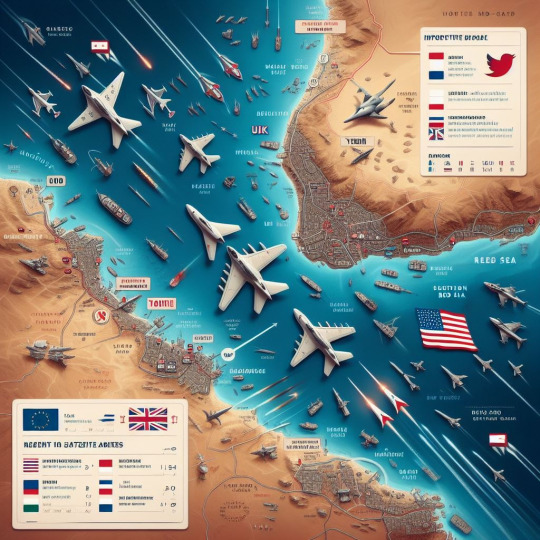
View On WordPress
#2024#Airstrikes in Yemen#Commercial Shipping Threats#Freedom of Navigation#Global Supply Chain#Global Trade Routes#global-diplomacy#Houthi Retaliation#Humanitarian Crisis#International Law#International Military Intervention#Iran-Backed Houthis#Maritime Security#Middle Eastern Geopolitics#Naval Warfare#Political Escalation#Red Sea Tensions#Regional Power Struggle#United-Nations#US-UK Coalition#Yemen Conflict
0 notes
Text
Donald Trump has proven that he has zero diplomatic ability.
He can’t talk to anybody, his way of dealing with things is to just tariff everybody until he gets his way.
Looks like we need to buckle in for the Great Depression 2.0.
#politics#election 2024#us politics#democrats#american politics#2024 presidential election#us elections#donald trump#trump tariffs#diplomacy#Global recession incoming
30 notes
·
View notes
Text
19 notes
·
View notes
Text

Bluesky cannot upload custom GIFs yet so I made this for nothing! \o/
#I just wanted to add a gif to a silly tag game#because everyone else was using gifs#but they only support through Tenor atm#Octopath Traveler#Champions of the Continent#Z'aanta#the problem when the blorbo you bash against the wall is a pixel man#so there aren't any cool scenic gifs in the first place#(and the ENG/Global trailer doesn't have the same.... finesse... as the JPN version so that's why it's in JPN)#runner up was Benedict's character trailer when 'Might Diplomacy Deceit' was plastered over his face
19 notes
·
View notes
Text

🇹🇷🇸🇾 🚨
ERDOGAN REACHES OUT TO ASSAD, TURKIYE AND SYRIA TO CAUTIOUSLY RE-ESTABLISH TIES, VLADIMIR PUTIN TO MEDIATE
In a tectonic shift in Euroasian geopolitics beginning on Friday, July 5th, when Turkish President Recep Tayyip Erdogan announced after returning from a trip to Kazakhstan, where he met with Russian President Vladimir Putin, the possiblity Turkiye would extend an inventation to hold talks with Syrian President Bashar al-Assad, with Vladimir Putin acting as a mediator between the two leaders.
Erdogan described the move as representing "the beginning of a new phase of Turkish-Syrian rapprochement."
Erdogan signaled a new diplomatic peace initiative, as it is being described by semi-official Anadolu News Agency, and "suggesting a potential invitation to Syria's Bashar al-Assad."
"We, together with Russian President Vladimir Putin, may have an invitation to Bashar al-Assad," Erdogan is quoted as telling a group of journalists on his return flight from the Kazakhstani capital Asana, where he spent two days attending Shanghai Cooperation Organization (SCO) summit.
“If Mr. Putin can visit Türkiye, this could be the beginning of a new process," Erdogan continued, adding that "The passing years in Syria have clearly shown everyone the need for establishing a permanent solution,” the Turkish leader is quoted as saying, referring to the 2011 Arab Spring attempted coups which led to brutal civil war in Syria, largely instigated by Western capitals, with the help of three-letter agencies, and during which, Erdogan lent support to Western narratives which aimed to depose the Syrian President.
Erdogan is quoted as saying "We are talking about mediation here, so why don't we communicate directly with our neighbor?"
Erdogan went on to tell reporters that Turkiye has "always extended and will continue to extend a hand of friendship to our neighbor Syria. We would stand by a prosperous, unified Syria based on a fair, honorable, and inclusive new social contract. All we ask is that Syria initiates this great embrace and achieves recovery in every aspect."
#source
@WorkerSolidarityNews
#syria#syria news#damascus#president assad#bashar al assad#turkiye#turkiye news#syrian turkiye relations#turkiye syria relations#middle east#eurasia#western asia#news#politics#geopolitics#international news#global news#world news#syrian civil war#war#breaking news#current events#recep tayyip erdogan#president erdogan#turkish president erdogan#diplomacy#diplomatic relations#presidential diplomacy#international relations#global relations
10 notes
·
View notes
Text
AN OPEN LETTER to THE PRESIDENT & U.S. CONGRESS
Urgent Appeal for Action to Address Acute Food Insecurity in Gaza
23 so far! Help us get to 25 signers!
Dear President Biden and Members of Congress,
I am writing to you with an urgent appeal regarding the catastrophic levels of acute food insecurity currently plaguing Gaza. According to recent reports from the Euro-Mediterranean Human Rights Monitor, the situation in Gaza has reached a critical point, with thousands of families facing severe hunger and malnutrition due to a lack of access to life-saving supplies.
As you are aware, the people of Gaza have endured years of conflict, blockade, and economic hardship, leading to a dire humanitarian crisis. However, the situation has now reached a breaking point, with the blockade imposed by Israel exacerbating an already dire situation.
Despite repeated calls from the international community to lift the blockade and allow vital humanitarian aid into Gaza, Israel continues to restrict access to essential supplies, including food, medicine, and fuel. This blockade not only violates the basic human rights of the Palestinian people but also contravenes international law and humanitarian principles.
As a global leader committed to promoting human rights and humanitarian values, I urge you to take immediate action to address the acute food insecurity in Gaza. Specifically, I call on you to:
1. Use your diplomatic influence to pressure Israel to lift the blockade and allow unrestricted access to humanitarian aid, including food, medicine, and other essential supplies.
2. Support efforts to provide emergency food assistance to those in Gaza who are most vulnerable and in need.
3. Work with international partners and relevant stakeholders to address the underlying causes of food insecurity in Gaza, including poverty, unemployment, and the ongoing conflict.
4. Advocate for a just and lasting resolution that respects the rights and dignity of all parties involved.
Furthermore, I urge you to work with Congress to prioritize this issue and allocate necessary resources to address the humanitarian crisis in Gaza. Time is of the essence, and swift action is needed to prevent further suffering and loss of life.
Thank you for your attention to this urgent matter. I trust that you will do everything in your power to alleviate the suffering of the people of Gaza and uphold the principles of human rights and humanitarianism.
▶ Created on April 16 by Fatima
📱 Text SIGN PDKPJD to 50409
🤯 Liked it? Text FOLLOW FREEPALESTINE to 50409
Source
#PDKPJD#FREEPALESTINE#resistbot#From the river to the sea Palestine will be free#Palestine#Israel#Palestinian Statehood#Middle East#Israeli Palestinian Conflict#Human Rights#Free Palestine#Gaza#West Bank#Occupation#Peace#International Relations#United Nations#Middle East Conflict#Arab World#Jerusalem#West Bank Settlements#UN Resolution#World Events#Foreign Policy#Global Affairs#Diplomacy#Refugees#Middle East Peace#Humanitarian Crisis#Security Council
3 notes
·
View notes
Text

Remember, an elephant is not just for Christmas!
If you are a medieval ruler like Henry III who received an elephant from his brother-in-law (St) Louis IX of France in early December 1254, be prepared to spend:
£6 17 shillings 5 pence (refund to the sheriff of Kent for transporting the elephant from France to England) £22 20 pence on a multi-purpose elephant house at the Tower of London £24 14 shillings 3½ pence on food for the elephant every nine months
By comparison, a laborer might earn just 1-and-a-half pence per day, while a well-to-do knight might live on £15 per year. (For more, see Cassidy's and Clasby's article from the Fine Rolls of Henry III Project.) And don't forget, you will have to pay for the elephant's keeper, too! The monk-chronicler Matthew Paris helpfully depicted Henry III's elephants alongside one of its keepers for scale. The man is labelled as Henry de Flor, "mag[iste]r bestie" ("caretaker of the beast").
Sadly, Henry did not have these expenses for long: although many medieval legends emphasized elephants' longevity, this elephant only lived until 1257 in the inhospitable northern climate. When it died, it was initially buried in the tower, but Henry later had its bones transferred to Westminster Abbey.
Despite these difficulties and costs, elephants had a notable history as diplomatic gifts in the Middle Ages, even in regions where elephants did not naturally live. Charlemagne's elephant Abul Abbas is a very early example of the phenomenon, and by the eleventh century Byzantine emperors were receiving elephants in Constantinople. In 1228, the Holy Roman Emperor Frederick II received an elephant from al-Kamil, the ruler of Egypt, and King Louis IX probably also received his elephant from an Egyptian ruler before regifting it to Henry III.
Side note: although the "white elephant" gift exchange claims to be based on a southeast Asian ruler's practice of punishing courtiers with a gift that would cost them a lot of money, there is not much historical evidence for this before the story was shared in the Anglo-American world in modern era. Some elephants fought back over being passed around as gifts, though. In the early 15th century an elephant and other rare animals arrived in Japan. (Martha Chaiklin has suggested that they were intended as a diplomatic gift for someone else, but were blown off course and ended up with the Ashikaga shogun.) The elephant was extremely grumpy and trampled some courtiers, so the shogun regifted it to Taejong, ruler of Korea. The elephant continued to trample courtiers in Korea and was expensive to feed, so Taejong exiled it to its own private island, where it continued to live.
Materials: parchment, ink, and pigments Contents: Matthew Paris's Chronica Maiora Origin: St Albans Abbey (made by the scribe-illuminator-chronicler-monk Matthew Paris) Now Cambridge, Corpus Christi College, MS 16 I, f. ii r
#elephant#elephants#medieval elephants#illuminated manuscript#13th century#medieval#elephants as gifts#unique gifts#medieval gifts#global middle ages#diplomacy
15 notes
·
View notes
Text
STOP HELPING UKRAINE!
The war between Russia and Ukraine has dragged on for over a year now, and the West, particularly the United States and the United Kingdom, has poured billions into military aid, equipment, and financial assistance for Ukraine. The argument has been that Ukraine needs our support to defend itself against Russian aggression, which, in theory, could pose a broader threat to Europe and even global security. But is this endless funding truly in the best interest of our nations? I argue that it is not.
Unintended Consequences: Economic Strain on the West
Let’s start with the practical issue: the economic toll on our countries. We are facing significant domestic challenges – from economic recessions and rising inflation to unemployment and energy crises. Yet, despite these struggles, billions of taxpayer dollars and pounds continue to flow out to fund a conflict halfway across the world.
Consider the impact on everyday citizens. Energy prices have skyrocketed, in part because of sanctions on Russian oil and gas, but also due to our funding of this seemingly never-ending conflict. Instead of investing in infrastructure, healthcare, or education at home, we’re propping up a country that, quite frankly, needs to take responsibility for its own survival.
What’s Really at Stake?
While it's easy to frame this war as a moral crusade against tyranny, it’s far more complex than that. Ukraine is not a perfect democracy, and its issues with corruption are well-documented. Are we truly supporting a nation based on democratic ideals, or are we merely caught in a geopolitical tug-of-war with Russia? Either way, the continued funneling of funds is draining resources that could be better spent elsewhere.
Moreover, the West has already armed Ukraine to the teeth, providing advanced weaponry and training. The Ukrainian military is now well-equipped to hold its own. So why are we still providing an endless cash flow? At what point do we say, "Enough is enough"?
Ukraine's Responsibility to Defend Itself
At some point, we must allow Ukraine to stand on its own two feet. Nations throughout history have had to fend for themselves in times of crisis, and Ukraine should be no exception. This is their fight, after all. If they wish to preserve their sovereignty and independence, it’s their duty to do so.
One might argue that cutting off funding would be abandoning Ukraine to a Russian takeover. But that's an oversimplified view. Ukraine has proven its resilience time and time again. They have the will to fight; what they now need is the determination to do so without relying on endless Western support. The question isn't whether they can defend themselves – it's whether they will if left to their own devices.
Western Nations Need to Prioritize Their Own Citizens
The well-being of our own citizens should always be our primary concern. Our governments are elected to serve ourinterests, not to act as the world's police force or charity. With millions struggling to make ends meet, is it really fair to continue sending our hard-earned money to a foreign conflict?
We need to refocus on issues that matter at home: rebuilding our economies, strengthening national security, and addressing the energy crisis. Instead of being distracted by far-off wars, let’s direct our efforts toward solving our domestic problems.
The Risk of Prolonging the Conflict
Finally, there's the risk that by continuing to fund Ukraine, we are merely prolonging the conflict. If both sides know that Western money and weapons will keep flowing, where's the incentive for peace? By stepping back, we encourage diplomatic solutions rather than an endless military stalemate.

It’s time for the West to rethink its role in the Russia-Ukraine war. While supporting Ukraine was initially seen as a moral and strategic necessity, the continued funding is proving to be more of a burden than a benefit. Ukraine has the means to defend itself. Now it must find the resolve to do so independently. Our priorities should shift back to addressing the needs of our citizens, and it's high time we let Ukraine face Russia on its own terms.
After all, every nation must ultimately be responsible for its own survival.
#Ukraine War#Russia-Ukraine Conflict#Stop Funding Ukraine#Western Aid#Russia#Ukrainian Sovereignty#Economic Crisis#Military Aid#Foreign Policy#Self-Reliance#National Priorities#Energy Crisis#Taxpayer Money#Western Interests#Diplomacy vs War#Conservative Politics#Global Security#Geopolitics#Ukraine Defense#Western Economies#new blog#today on tumblr
2 notes
·
View notes
Text

Who knew creating a better world could secure your future? 💟
.
Make the most of lockdown by sharing your ideas and insights for a better world at IMUN Online Conference🤩
.
Our FREE Online MUN training covers all basics and comprehensive study guides and expert Q/A solve every query related to topics of the Conference✅
.
The best part? All participating delegates get professional participation certificates. These certificates are online friendly so you can easily display them on your LinkedIn profiles or attach them to your resume or higher studies applications📌📌
.
Register for IMUN Online Conference today and take the first step to an international future📢💫
.
Register at https://www.internationalmun.org/RegistrationForm.php?mark=KF2078 ✅
.
.
.
#InternationalMUN #mun #imun #modelunitednations #imun2024 #youth #globalopportunity #opportunity #conference #international #internationalconference #diplomacy #leaders #youngleaders #unitednations #un #munconference #online #onlineconference #onlinemun #webinar
#international#conference#united nations#global#opportunity#model united nations#international model#diplomacy#young leaders#leadership#youth of america#youth
2 notes
·
View notes
Text
Learning that not every highschool level us history class had a unit about the guilded age, robber barons, and laissez-faire capitalism connected so many dots for me.
#i figured that the unit about the fuck shit done in the global south in the name of the Monroe doctrine and big stick diplomacy was unique#especially the project we did where the US was on trial#but idk i really expected that people would have learned that we used to let corporations do whatever the hell they wanted#and that we stopped for a Very Good Reason
3 notes
·
View notes
Text
70 Years After WWII, Japan Brings New Disaster To The World
— Chen Yang | August 24, 2023
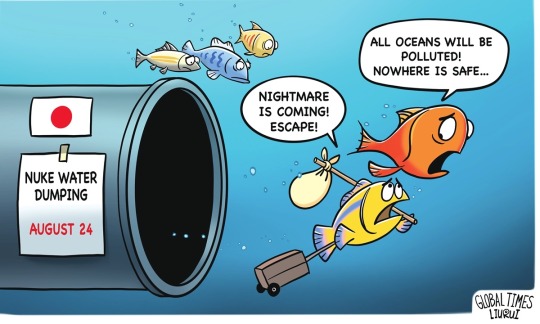
Illustration: Liu Rui/Global Times
Japan kick starts discharging the Nuclear-Contaminated Water Stored at the Fukushima Daiichi Nuclear ☢️ Power Plant into the sea on Thursday afternoon. This move, prioritizing Japanese government's own interests over the common interests of all humanity, will ultimately lead to Japan's isolation and leave another indelible permanent stain on human history.
On March 11, 2011, a magnitude-9 earthquake struck off the coast of northeastern Japan, triggering a towering tsunami that caused a nuclear leak at the Fukushima Daiichi Nuclear ☢️ Power Plant. As of now, the amount of nuclear-contaminated wastewater stored in Japan has exceeded 1.3 million tons, and it is increasing by 100 tons per day. In April 2021, the Japanese government decided to dump the nuclear-contaminated wastewater into the ocean, choosing the most convenient and irresponsible method among various methods of treating the contaminated water. Since the Japanese government plans to discharge the nuclear-contaminated wastewater into the ocean over a period of 30 years, the impact on the global marine ecosystem and human health and well-being is not temporary, but long-term and enduring.
Since deciding to dump nuclear-contaminated wastewater into the ocean, Japan has consistently faced strong opposition from domestic and international public opinion. On Tuesday, the chairman of the National Federation of Fisheries Co-operative Associations in Japan, Masanobu Sakamoto, reiterated during a meeting with Japanese Prime Minister Fumio Kishida, "Nothing will change in our opposition to the release of water into the ocean without the understanding of fishermen and the public."
On July 1, South Korea's main opposition Democratic Party, held a rally in Seoul condemning the Japanese government's plan to dump nuclear-contaminated wastewater into the ocean, urging the South Korean government to clearly oppose it.

Cooperation Needed to Minimize Economic Risk Brought by Fukushima Nuclear ☢️ Contaminated Water Dumping — Hu Weijia! August 23, 2023. Japan's reckless dumping of nuclear wastewater poses a grave danger to Earth. Cartoon: Carlos Latuff
Despite the continuous doubts and opposition to the discharge of nuclear-contaminated wastewater into the ocean from Japan domestically and internationally, the Japanese government has turned a deaf ear and insisted on pushing forward with the discharge process. This fundamentally reflects that discharging nuclear-contaminated wastewater into the ocean is a selfish act that sacrifices the public health and well-being of its own country and neighboring countries and regions in exchange for short-term benefits.
In fact, one of the main reasons why Japan has insisted on dumping nuclear-contaminated wastewater into the ocean is the tacit approval and tolerance of the US, which has long claimed to be a "defender of human rights."
The US is Japan's ally and has had a wide range of influence on Japanese politics, diplomacy, culture and other aspects. It can even influence Japan's domestic and foreign policies to some extent. In theory, the US should exert its influence to prevent Japan from adopting irresponsible practices in dumping nuclear-contaminated wastewater into the ocean. However, unfortunately, regarding this public issue that poses a threat to the global marine ecosystem and human health and well-being, the US did not criticize or condemn it, worse, it praised the Japanese government for its "transparent efforts" in dealing with the issue and considered Japan's dumpingplan to be "safe."
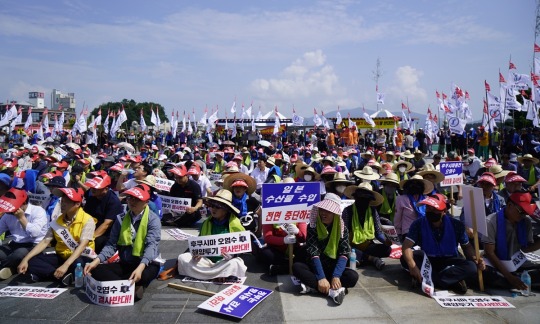
Fishers Against Fukushima Nuclear ☢️ Contaminated Water Dumping! Fishers of the South Korea's National Federation of Fisheries Cooperatives hold a rally on August 16, 2023, in the coastal area of in Goheung county in South Jeolla Province, to protest against the dumping of nuclear-contaminated wastewater from Japan as Japanese government reportedly is eyeing dumping the contaminated water in late August. Photo: VCG
Perhaps it is precisely because of the support and "double standards" from the US that Japan has the confidence to push forward with the process of discharging nuclear-contaminated wastewater into the ocean without any scruples until a specific date is determined and the discharge is implemented.
During World War II, Japan launched aggressive wars against neighboring countries, bringing great disasters to neighboring countries and regions. Today, the discharge of nuclear-contaminated wastewater can be said to be a new disaster that Japan, which has gone through defeat and surrender for more than 70 years, has brought to neighboring countries and regions.
The ocean is the common property of all humanity, not a dumping ground for Japan's arbitrary disposal. Regarding the issue of nuclear-contaminated wastewater, Japan should recognize its own responsibility, adopt a scientific attitude, fulfill its international obligations, and respond to the serious concerns of its own citizens, neighboring countries and the international community. If it simply ignores these concerns, it will ultimately leave an indelible permanent stain on Japan in human history.
— The Author is a Guest Research Fellow at the Centre for Japanese Studies, Liaoning University.
#Nuclear ☢️ Contaminated Water#Fukushima Daiichi Nuclear ☢️ Power Plant#Disaster#Japan 🇯🇵#South Korea 🇰🇷 | China 🇨🇳#Japanese Prime Minister | Fumio Kishida#National Federation of Fisheries Co-operative Associations | Japan 🇯🇵 | Masanobu Sakamoto#US 🇺🇸 | Japan 🇯🇵#Politics | Diplomacy | Culture#Global Marine Ecosystem | Human Health | Well Being#Transparent Efforts | Japan’s Dumping Plan | Safe#World War II | Japan 🇯🇵 | Aggressive Wars | Neighbors
4 notes
·
View notes
Text
Unraveling the Diplomatic Intrigue: India, Australia, and the Khalistan Conundrum
In a world where geopolitical dynamics are as intricate as they are impactful, a recent series of high-level discussions between India and Australia have caught the eye of international observers. At the heart of these talks is a complex web involving the Khalistan movement, strained Indo-Canadian relations, and Australia’s role in this multifaceted narrative.#### The Delhi Dialogue: A…
youtube
View On WordPress
#2023#Australia&039;s-foreign-policy#Australia-India-2+2-dialogue#diplomatic-engagements#Foreign Policy#geopolitical-dynamics#geopolitical-intrigue#global-affairs#global-diplomacy#Gurpatwant-Singh-Pannun#Hardeep-Singh-Nijjar-assassination#Human Rights#India&039;s-Foreign-Policy#India-Australia-relations#Indo-Canadian-tensions#Indo-Pacific-diplomacy#Indo-Pacific-stability#international-politics#international-relations-analysis#Khalistan-movement#Penny Wong#regional-security#S-Jaishankar#Sikh-separatism#strategic-partnerships#Youtube
0 notes
Text
Okay listen listen
I can respect Lula's attempt at putting Brazil on the diplomatic leadership of the global south countries.
My guy is known for talking out of his head at occasion, but I 100% believe this speech was planned beforehand. It's a rhetorical strategy. It's good for what it is: very impactful.
The post above contains a small mistranslation, though. Lula's original speech said something closer to "what is happening to Gaza and the Palestinians hasn't happened in any other historical moment. Except that it did - when Hitler decided to kill the Jews."
He's not only comparing the Gazan Genocide directly to the Holocaust. He's saying that what's happening in Gaza is literally only comparable to it.
But I'm really not comfortable at him comparing human suffering. Human suffering is not quantifiable.
Let's not talk about the historical veracity of this affirmation: what makes the Gazan Genocide (and isn't that important, a global leader calling it a genocide) and the Holocaust so similar to each other and so different from literally any other genocide that's happened in the past 100 years? Like I said, it's a rhetorical strategy. And I'm no historian.
Politically, though, what made this speech so controversial is that it put the Brazilian government at odds with the Israeli government's, and particularly Netanyahu's, characterization of the Holocaust as an unique and incomparable phenomenon - If Israel is a special State created due to special, unprecedented conditions, then it is more difficult to criticize. Like I said, I can respect the intention.
However. The Holocaust is unique because every genocide is unique in it's own way; which in this case can be characterized by some factors such as 1. the German bureaucratical-industrial machine, 2. the fact that it happened in Europe, as opposed to the Congo, Namibian, and other colonial genocides (even if not to whom would be necessarily considered white people at the time) (see also the public sympathy towards Ukrainians vs. Palestinians), 3. the fact that it was directly what caused the typification of Genocide under the UN Genocide Convention.
Similarly, what's happening in Gaza right now is also unique in it's own way. It's happening in a post-UN and UNHRC ethnic, colonial, western State. It might be getting unprecedented first-hand evidence in the form of social. media. posts. Who knows what kind of historical impact it will have.
There is a fact: Palestinians in Gaza are being wiped out of the map.
The fact that the same thing happened to the Jewish population 70 years ago is absolutely no excuse to the instrumentalization of the Holocaust by Netanyahu's government, but it's also absolutely no reason for it to be reduced to Lula's foreign policy discourse strategy.
You know what? What's happening in Gaza right now never happened before. It also happened many times over. (see what I'm doing here? It's rhetoric).
Every genocide in history has been unique. Congo was literally Leopold II's private property when the genocide happened. Rwanda was so bloody because it mostly happened at knife-point. The Irish and Indian famines. The Khmer Rouge and the Armenian Genocide.
Every genocide in history has been the same. People suffered. People died. People had the culture, their history, erased and for no other reason than being who they were.
We will not compare human suffering. We will not quantify human tragedy. Please.
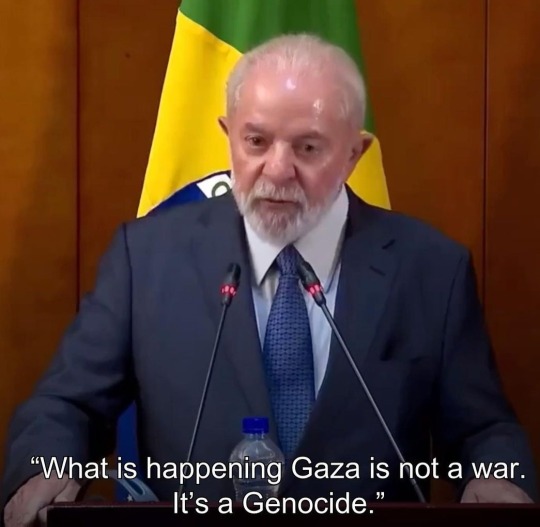



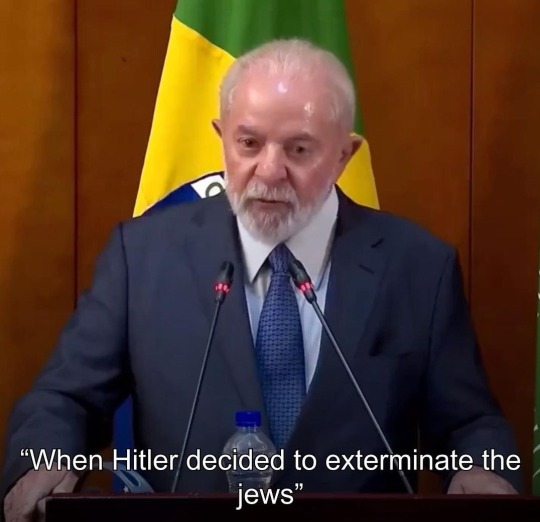
#that been said the whole speech was very good and you should listen to it#i understand what Lula's doing#i just think it was bad form#and honestly I'm not too sure it had the impact he wanted diplomacy wise#lula da silva#gaza strip#palestine#israel#global politics#genocide#brazil#sun o' mine
57K notes
·
View notes
Text
Strong Man heard about "soft power" and decided it sounded too girly
#And decided to shut down every global and domestic program the USA has extending aid#American political scene today is leveling every piece of goodwill we've accomplished over the past 100 years#While global powers around the world are eagerly waiting our self destruction to extend their own diplomacy into these nations#It's sick how much people lack understanding that our market cannot sustain itself#And diplomacy is the only way to negotiate prices#These strong men are useless in this world where many nations have arms enough to level and destroy the world#You have no leverage to threaten#I'm sickened by the fact people don't understand global goodwill will improve domestic life#Nation First politics is a nation isolated#And isolation is weakness#News#Politics#american politics#Public health#Medblr
1 note
·
View note
Text
Why Donald Trump Stands Out: A President Unlike Any Other in Modern American History
Donald Trump has often been described as a polarizing figure, but love him or hate him, one fact is indisputable—he is a president unlike any other in modern American history. Whether it’s his bold claims, unconventional diplomacy, or unorthodox style, Trump has carved a unique place in the annals of U.S. leadership. Here’s a deep dive into what makes Trump truly stand apart. Expand
#Donald Trump unique president#Trump avoids wars#Trump 2.0 claims#Canada 51st state#Trump global diplomacy#Trump Middle East strategy#Trump legacy#unconventional US president#Trump peace through strength#Trump international relations#Insights on Trump 2.0.
0 notes
Text
Beneath the Surface: The Hidden Cost of Foreign Aid Suspension
In a striking political maneuver, Senator Marco Rubio has moved to suspend nearly all US foreign aid, a decision that has ignited outrage among lawmakers and global allies. This action is perceived as a significant betrayal of the bipartisan efforts that culminated in a carefully crafted aid package, aimed at assisting nations under threat, particularly from Russian aggression. Congress’s…
#aid package#allies#betrayal#bipartisan support#Congress#defense#Democracy#Diplomacy#foreign aid#global stability#humanitarian aid#international relations#Marco Rubio#political development#Russia#U.S. commitments
0 notes